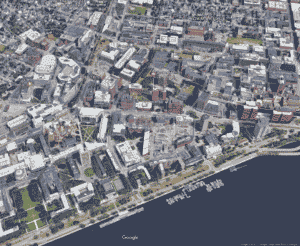Some of Kendall Square’s biggest employers are taking action to find solutions to the traffic problems that bedevil the neighborhood, and the Boston area more generally.
The Kendall Square Association has convened 18 of the area’s top employers representing 18,000 Massachusetts workers, thanks in part to a $150,000 grant from the Barr Foundation, as part of its Transportation ADVANCE initiative and charged them with creating three to six data-driven experiments and running pilots to find strategies that can be scaled up.
“This isn’t about solving Kendall’s problems,” KSA President C.A. Webb said in a statement. “Together we will identify thoughtful solutions which make commutes easier and more enjoyable for workers across the commonwealth in the short term, while we continue our work advocating for long-term solutions to our transportation crisis.”
Representatives of the companies involved will meet for the next 18 months to develop and pick pilot projects and review their outcomes. Some ideas under consideration include “creative parking strategies to incentivize more trips on transit,” “new approaches to carpooling” and infrastructure improvements like dedicated bus lanes, although it is not clear whether these improvements would be confined only to the Kendall Square area.
In its announcement of the plan, the KSA promised data from the pilot projects will be shared with employers across the state to help them start transportation projects of their own.
As one of the region’s largest concentrations of businesses and largely dependent on one subway line, Kendall Square faces significant transportation challenges, which were made even worse by a summer Red Line derailment that disrupted service on the line for months. A survey of the state’s biotech workers – whose jobs are concentrated in Kendall Square, the Seaport District and the northwest suburbs of Boston – released in September by the Massachusetts Biotechnology Council found most commuted at least 45 minutes to work, and their commutes were getting worse. For those that rely on public transportation, 79 percent were late for work due to delays on public transportation in August, 69 percent were late for personal commitments after work and 61 percent had public transportation service break down at least once.
Transportation problems are hurting employers’ ability to attract and retain talent. The MassBio survey found 60 percent of respondents would change jobs for a better commute and 23 percent have even considered moving to a different state for a better commute. Among commuter rail riders, that figure was 76 percent. Biotech workers surveyed also want action from government: 82 percent of respondents did not think the state government was doing enough to improve transportation systems, and 64 percent said they are likely or very likely to support increased taxes or fees to fix the transportation systems.
“Sarepta is dedicated to doing its part and finding new solutions for the current commuting challenges that face Cambridge-based employees. Through Transportation ADVANCE, we look forward to being active participants in this endeavor and working closely with KSA and our local community,” Sarepta Thearaputiscs Senior Vice President for Human Resources Joan Nickerson said in a statement.
“The Transportation ADVANCE working group is a great example of the broader Kendall Square community collaborating to foster creative new solutions to our transportation challenges,” Johannes Fruehauf, co-founder and president of shared-lab operator LabCentral said in a statement. “As LabCentral continues to grow in Kendall Square, an efficient, resilient and multi-faceted transit system plays a critical role in the work/life balance of our employees and residents so they waste less time commuting and can focus more on scientific breakthroughs and biotech innovations.”







